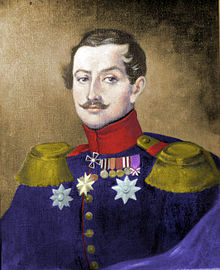Alexander Chavchavadze
| ალექსანდრე ჭავჭავაძე Alexander Chavchavadze |
|
|---|---|

Prince Alexander Chavchavadze
|
|
| Born | 1786 St Petersburg, Russia |
| Died | 6 November 1846 |
| Allegiance | Imperial Russia |
| Years of service | 1811–1846 |
| Rank | Lieutenant General |
| Unit | Imperial Russian army |
| Battles/wars | War of the Sixth Coalition, Russo-Persian War, 1826-1828, Russo-Turkish War, 1828-1829, Caucasus War |
| Awards | Order of St. Anna, Order of St. Vladimir, Légion d'honneur |
Prince Alexander Chavchavadze (Georgian: ალექსანდრე ჭავჭავაძე; Russian: Александр Чавчавадзе) (1786 – November 6, 1846) was a notable Georgian poet, public benefactor and military figure. Regarded as the "father of Georgian romanticism", he was a pre-eminent Georgian aristocrat and a talented general in the Imperial Russian service.
Alexander Chavchavadze was a member of the noble family elevated to the princely rank by the Georgian king Constantine II of Kakhetia in 1726. The family was of Khevsur origin but had intermarried with other Georgian military and noble families.
He was born in 1786, in St Petersburg, Russia, where his father, Prince Garsevan Chavchavadze, served as an ambassador of Heraclius II, king of Kartli and Kakheti in eastern Georgia. Tsarina Catherine II of Russia was a godmother at the baptism of infant Alexander, showing her benevolence to the Georgian diplomat.
Alexander’s early education was Russian. He first saw his native Georgia at the age of 13, when the family moved back to Tiflis after the Russian annexation of eastern Georgia (1801). At the age of 18, Alexander Chavchavadze joined Prince Parnaoz, a member of the dispossessed royal family, in the 1804 rebellion in the mountainous Georgian province of Mtiuleti against Russian rule. Following the suppression of the uprising, he was briefly put in prison where he composed his first literary works, including a radical poem written in Georgian, Woe to This World and Its Tenants (ვაჰ, სოფელსა ამას და მისთა მდგმურთა). The poem quickly gained popularity, and brought early fame to its young author. His manuscripts were widely circulated with his lyrics of love or protest, written in the spirit of the 18th-century Georgian poet Besiki or of the French Enlightenment philosopher Jean-Jacques Rousseau, sung in Tiflis and elsewhere in Georgia.
...
Wikipedia
